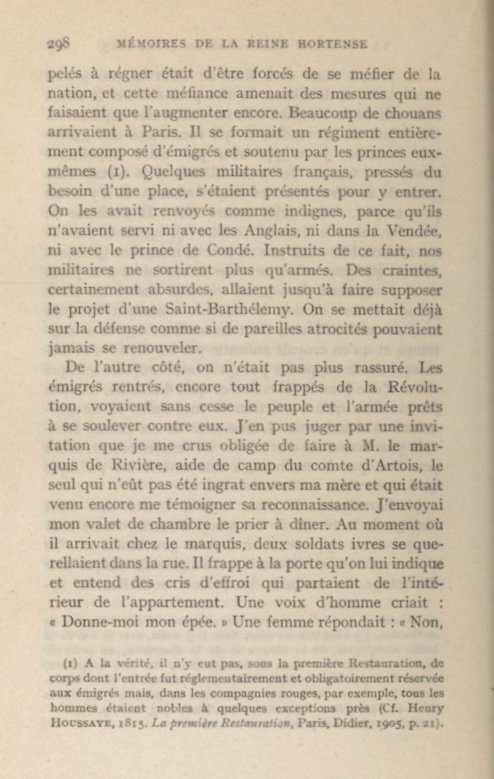Let’s have another look at Hortense’s Memoirs. If you want to read the book it is available for free at the side bar in English and French. Use the widget on the sidebar to translate the text below into pretty much any language.
When rulers are seconded by the bribed and blackmailed, they are always afraid and this fear leads to horrible oppression and numerous mistakes. They can only continue their reigns through amping up fear and terrorism and by suppressing knowledge, genuine faith and self esteem until life becomes intolerable for the unfortunates trapped under their rule.
Hortense’s memoirs continues:
Always our amusements were the same. Billiards, music, reading aloud occupied our evenings. I never spent an evening away from home. My drawing-room became a spot so well known and so admired on account of the distinguished people who were to be found there that this mild social success aroused other animosities against me even more to be dreaded than political enmities—those of young women, whose attacks were not limited to the field of politics.
Monsieur de Flahaut, Monsieur de La Bedoyère, Monsieur de Latour-Maubourg, Monsieur de Canouville, Monsieur de Lascours had been in the habit of going every evening to the house of Madame de Girardin.
Madame Alfred de Noailles, one of the young women who had gone out to meet the Allies the day of the fall of Paris, also went there. She was agreeable, animated and was one of the people who contributed the most to make these evenings a success.
The sort of struggle that went on between the partisans of the different political parties gave a particularly spirited tone to the conversation, and since it is always awkward to declare oneself the enemy of a pretty woman, the discussions were just violent enough to be renewed the following day.
Madame de Noailles had earnestly advised these gentlemen to let bygones be bygones and to make their peace with the new court party. But her efforts had been useless. They persisted in continuing the line of conduct they had already selected. She therefore no longer attempted to persuade them but displayed her preference for the company of young men of promise, whom she even allowed to jest at her former more old-fashioned friends, thus showing that she would rather quarrel than be bored.
On my arrival from Saint-Leu all these gentlemen, who with Messieurs de Segur, Lavallette, de Broglie, Mollien and Mole had always come to my receptions, returned to them immediately.
This was doubtless the reason for which Madame Alfred de Noailles hated me cordially. I was constantly being made a target for her attacks. I am not confusing her with her cousin Madame Juste de Noailles, who was always gentle and kind.
Madame Alfred de Noailles said one day in her own home in the presence of a number of people that my house served as the headquarters for a group of extremely dangerous men. She added that I stimulated their ardor, that steps should be taken to guard against the result of their conspiring, that Monsieur de La Bedoyère was an out-and-out Jacobin.
In short, they all had something unpleasant said about them. They heard of this from one quarter or another, Monsieur de La Bedoyère from his wife, one of whose friends was present, and I from Monsieur Boutiaguine, for members of foreign embassies were also present.
My friends were furious that a young woman who had been brought up with me should try to do me such grave harm, disturb my peace of mind and endanger the health of my children by taking advantage of the delicacy of my present position.
Thus, undue enmity provoked excessive partisanship, and I, desiring only to be left in peace, found myself between the upper and the nether millstone. How was I to put an end to this state of things? One day at a dinner given by Madame de Girardin my young defenders agreed not to speak to Madame Alfred de Noailles.
She demanded an explanation, which no one would give her. Thus, the situation became still more involved. I disapproved of this act of rudeness toward any woman. I said as much and continually tried to pour oil on the troubled waters.
It was impossible to restore peace. There was, moreover, another reason for complaint against me. The Duchesse de Mouchy, Madame de Noailles' mother, lived just across the street from me.
She had a day on which she received her friends. But only a few cabs and carriages ever drove up to her door, and these were obliged to make way for the considerably larger number of vehicles which stopped in front of my house. It was out of the question for her to continue to submit to such a superiority on my part, especially as one would have expected recent events to have done away with it.
It seemed difficult to accept the fact that some little of the prestige of my former rank still remained and that having in the past only been attached to my friends they should not all have abandoned me.
The hostility of these ladies found it more convenient to explain this loyalty, which my misfortunes had perhaps increased, as a political cabal than to attribute it to its natural cause. The persistent animosity this coterie displayed toward me was an example of that which many other circles manifested toward anything that belonged to the former regime.
The two parties were constantly observing one another, estimating one another's strength and growing more and more actively hostile. It was the misfortune of princes summoned to reign under such conditions that they could not count on the loyalty of their subjects, and this lack of confidence caused them to take steps that still further envenomed matters.
The original French is available below:







